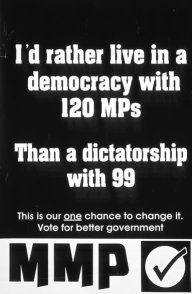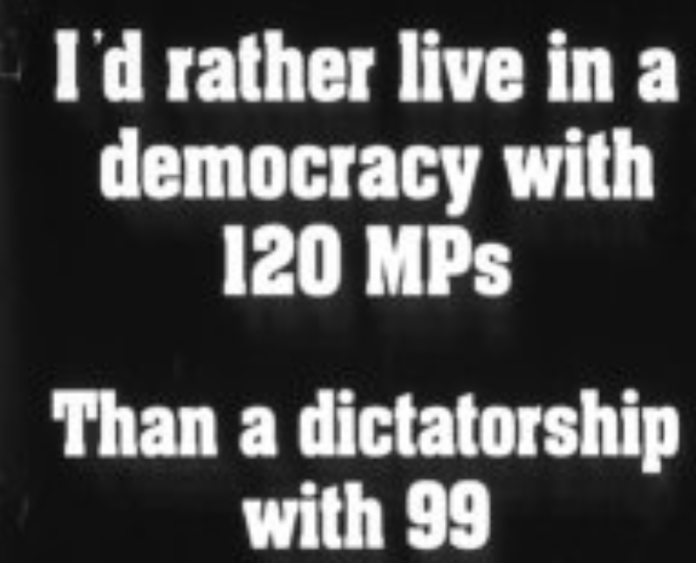A quarter of a century ago today a young(ish) senior lecturer from the University of Canterbury was elected as a neophyte MP in the first MMP election. It is fair to say she was totally surprised, not to say shocked, by this turn of events.
It was a time of great uncertainty. With the Governor General expressing concern she may need to use emergency powers, and powerful nay-sayers predicting doom, we entered this new era with few rules on how to work such a system.
I was asked on RNZ the other day whether I believed there would be a move back to FPP. I answered that I could see no sign at all of a desire to change from the current system.
Those of you who were too young in those days, might not remember that the move to MMP was borne of years of unaccountable action by successive governments. In National (1975-1984) Muldoon practically governed as a one-man band, neglecting areas in which he had little interest and bullying his way through in important areas. His swansong, the announcement of a snap election while drunk, due to his inability to rein in Marilyn Waring’s vote, reflected that period.
The 1984 Labour Government seemed like a breath of fresh air, but in three years had almost abandoned all the tenets of a Labour Government in favour of free market economic principles. It took a further three years to get rid of that government (nearly destroying the Labour Party in the process).
This was followed by a National Government which seized gleefully on the anti-statism of Labour and extended it. Promises were broken. Instead of abolishing Labour’s $1250 tertiary fee, Minister Lockwood Smith devolved the ability to set fees to individual institutions.
By 1993 the fervour of neo-liberal reform had begun to burn out. It was, in many areas of society, completely unworkable – the state was needed, and needed to regulate and provide. The campaign for MMP was built on the need to add checks and balances to governments to ensure that such radical reforms could no longer be pushed through by a tiny minority of people in a government. Also, years of minority governments (more people voted for the opposition, but winning was counted by number of seats alone, and minor parties might get a large number of votes but fail to win a seat) were seen as increasingly unfair.
I should mention here the shining light of Rod Donald, who put everything into the struggle. It was a tragedy when he died so young.
So there we were, 25 years ago today, shiny-eyed with hope for the future. The Alliance was an amalgamation of five parties: NewLabour, the Greens, Mana Motuhake, Liberals and Democrats. We were very disciplined in the early days, with a couple of exceptions.
The late Alamein Kopu had virtually no political experience and hated parliament from the first. Her interests were in promoting te reo Māori and tikanga Māori across all government institutions. She was well ahead of her time (for example refusing to speak English) but was an ineffective MP. Read her Wikipedia page for the full story.
Frank Grover was our other defector in that first term. The Liberals joined the Alliance as part of the anti-neoliberalism coalition of forces. He was, politically, of the Christian Right and he hated our leftie social policy framework. He, too, was gone by lunchtime, setting up the Christian Heritage Party which then spawned Graham Capill and his paedophile ways, which effectively destroyed that party from within.
Gosh, I had forgotten how convoluted MMP politics were. NZ First was going through its own splits, of course. ACT has also had its moments and, until recently has struggled to find support.
Labour and National were very keen to ensure their continuation as the ‘major’ parties during MMP. Thus we have had Labour-led and National-led, before this term’s extraordinary majority Labour government. The future is uncharted. We cannot know what the second quarter century of MMP will bring. Will there continue to be ’major’ and ’minor’ parties? Will we become more like Germany, with its myriad voices inside parliament but with a strong democracy?
Without MMP there would be no Kiwibank (Jim A.) and no paid parental leave (Laila H). There would have been no gold card with its free public transport for those over 65 (Winston P). Along with the good, there is no capital gains tax on subsequent properties.
Such a long time, 25 years. It has taken a long time to get rid of neo-liberal thinking and policies, and it is still with us in many ways. I voted Labour for the first time since 1987 at the last election, which felt like a bit of a betrayal of MMP, but what choice was there? There needs to be a new leftie party in Aotearoa, representing the politics of a fair economy and better society. But I won’t hold my breath.
Happy Birthday, MMP and may your life be long and productive!

Dr Liz Gordon is a researcher and a barrister, with interests in destroying neo-liberalism in all its forms and moving towards a socially just society. She usually blogs on justice, social welfare and education topics.



Back Bench pay is $160k
That’s a lot of money to poorly skilled workers, people who have lived off benefits, people who have been assistants or researchers on Non Government Organization NGOs (which interfere in political affairs of other countries) or about the same pay for teachers, cops, health workers and other government bureaucrats who have at least reached senior management.
But, its not a lot of money and as such, the position of MP fails to entice higher ranking and higher government or private sector bureaucrats, or enterprising entrepreneurs or other private sector business people who have risked capital to build their commercial successes and therefore annual revenue streams of in excess of $250k pa.
$160K is not enough to entice quality people to a job where their career prospects rest in the hands of fickle voters and not the outcomes of productivity which is the reward of enterprising perspicacious private sector performance.
As a result, the quality of most MPs is pitiful.
In my view.
To entice high performers to enter parliament. the pay needs to be $500k with a maximum 2 terms then out.
Less MP’s is the key better outcomes.
Committees are talking shops where decisions are rarely made: therefore the less the better.
60 MPs is plenty. That’s One for about 84,000 voters.
We disagree Dr Liz – but like you, I wont hold my breath.
Ross Meurant. Agree, especially re better pay to attract high calibre people, but whether this is the sole reason for the woebegone bunch who sit in Parliament now, I don’t know – and that applies to all political parties, not just some of the current inadequate ministers.
My 2 cents. Always thought the truly intelligent people are blue collar not white. Practical experience combined with paper/computer skills is the best good combo. Highly paid pencil pushers actually know fuck all and fuck everything up all the time. Head hunting these idiots will bring more of the same at higher cost. Just saying.
The concept of MMP wa distroyed by Winston . I hope once he is off the scene it can progress. The 5 Maori Seats need to go as there are plenty of Maori on both sides of the fence to protect the advance of their voice .
I agree Trevor
Maori seats were created same time as seats for Miners – at a point in time when voting rights were predicated on land ownership.
Miners did not won the land they mined.
Maori collectively owned theirs.
When land rights to voting were abolished, miners seats disappeared.
Maori seats were retained.
no no no, Maori are incredibly disadvantaged in our society.
The seats must remain.
How exactly are they disadvantaged? And how does segregating them into different electoral roll help them?
In fact the Royal Commission recommended the disbandment of the Maori seats and it is a terrible shame it wasn’t done.
Parliament is like a cauldron that mixes morally virtuous individualistic people and converts them into a collection of greed filled selfish bastards who understand that enriching the MP collective is all that really matters.
The opposition to the MMP campaign was an opportunity for the business sector to publicly flex their muscle and they were led by the then Chair of Telecom Peter Shirtcliffe via the Campaign for Better Government.
I remember his rigid and condescending interview style and it only helped to push the referendum in MMP’s favour.
I agree that we need a true “leftie” party with strong socialist leadership but with a community riven with inequity the majority of people who would support that party are just trying to survive.
The Labour party chose no CGT or wealth tax which guaranteed an historical victory but left unbridled a property market that has disenfranchised so many and burdened others with eyewatering debt.
The capitalist/neoliberal financial model is deeply entrenched in the establishment.
Thank you Dr G for your contribution here and in general.
It is much appreciated by this reader.
Dr
You are accurate re Frank Grover
Caused trouble wherever he went: National Party guru in Hamilton once but was terminate or departed in a fit of petulance
Comments are closed.